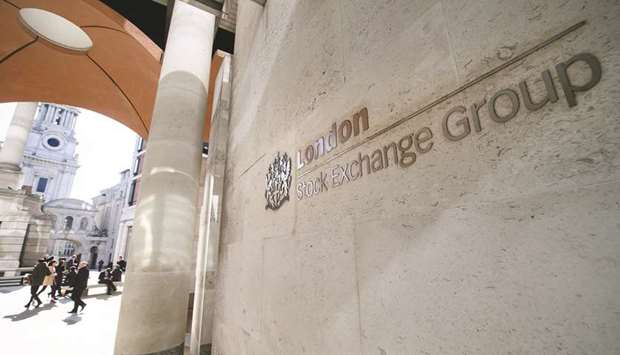London’s FTSE 100 ended higher yesterday as markets recovered from the initial shock of US President Donald Trump testing Covid-19 positive, although Brexit concerns and a 22% plunge in miner Centamin capped gains for the more domestically-focussed index.
Trump said yesterday he and his wife Melania were going into quarantine, raising concerns about the impact on his presidential campaign less than five weeks before the election.
The blue-chip FTSE 100 index closed up 0.4% after losing as much as 1.2%, taking weekly gains to 1% after two weeks of losses.
“We are seeing a more level-headed approach given that President (Trump) may only suffer a mild form of the virus,” said Joshua Mahony, senior market analyst at IG.
“While the White House has insisted that Trump is capable and working in isolation, the progression of his condition will likely provide another key element for traders to track over the coming week.”
Oil stocks tracked crude prices lower, while gains were led by financials and commodity-linked stocks.
“We expect risk assets and cyclical assets to continue to fluctuate in sync with the public health situation, vaccine-related news...in the months to come,” said Nannette Hechler-Fayd’herbe, chief investment officer at Credit Suisse in London.
The blue-chip index currently trades higher than its March lows, but with British scientists warning it was still likely that a resurgence in Covid-19 cases was spreading exponentially, and a UK trade deal with the European Unions still uncertain, the outlook for further gains appears bleak.
The mid-cap FTSE 250 lost 0.1%, with gold miner Centamin Plc tumbling after it forecast a fall in annual production.
The British Chamber of Commerce said yesterday many more British companies reported a fall in sales over the past three months than the ones who experienced an upswing, despite the lifting of most coronavirus restrictions.
Global equities dropped after US President Donald Trump revealed that he and his wife have tested positive for Covid-19, sparking fresh political chaos in the world’s biggest economy just one month before Americans go to the polls.
The heightened turmoil sent US futures sinking as investors nervously awaited Wall Street’s reopening, with key non-farm payrolls data slated for publication.
Europe’s major bourses dropped sharply at the open before clawing back ground.
Japan’s Nikkei closed down 0.7% as trading resumed following Thursday’s market shutdown caused by a technical fault — and amid holiday closures in many key Asian hubs.
Oil prices tanked 4%, extending Thursday’s heady losses that were also rooted in the market being awash in crude amid timid demand.
“The increase in political uncertainty connected with Trump’s diagnosis is...weighing on stocks and stock futures, and supporting safe havens such as the yen, Swiss franc and the US dollar,” Rabobank analyst Jane Foley told AFP.
“The extent to which the election campaign is affected will depend on the outcome for Trump’s health.”
She added: “There are sufficient unknowns at this stage to fan speculation that the election could be quite different from the one that was expected just 24 hours ago.”
The extraordinary setback for Trump, 74, has immediate political consequences just 31 days before election day, forcing him to cancel campaign trips and adding new volatility to a contest already steeped in tension.
The White House doctor has said that both were well and that Trump would continue his presidential “duties without disruption”.
The president had taken a test after his close White House aide Hope Hicks had tested positive earlier in the day, meaning he will now have to go into quarantine just weeks before one of the most crucial elections the country has ever had.
Investors were already feeling pessimistic over US lawmakers’ failure to pass a new stimulus bill, dealers said.
“We are seeing some risk aversion on the back of the Trump news, although as yet the moves we’re seeing are quite modest,” Oanda analyst Craig Erlam told AFP.
“Should Trump’s health deteriorate, I expect we would see more significant moves, but there’s no sign of that at this moment.”
Sentiment had already been weak as hopes for a new US rescue package fade.
“It is also worth noting that stimulus talks this week have not gone well which may be contributing to the risk-aversion we’re seeing in the markets, while today’s (US) jobs report may be making people a little cautious,” Erlam added.
Democrats pushed their latest $2.2tn proposal through the House, where they hold a majority, but without any opposition support, there is no chance it will be agreed by the Republican-dominated Senate.
Business / Business
World stock markets slide after Trump catches Covid-19; London’s FTSE 100 recovers

A sign pictured on a wall outside the entrance to the London Stock Exchange. The blue-chip FTSE 100 index closed up 0.4% yesterday after losing as much as 1.2%, taking weekly gains to 1% after two weeks of losses.
